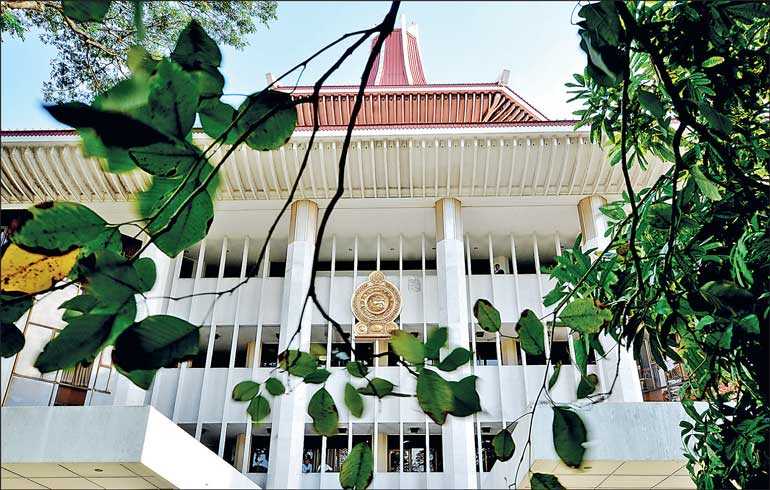Monday Feb 16, 2026
Monday Feb 16, 2026
Friday, 3 July 2020 00:00 - - {{hitsCtrl.values.hits}}

The problem of building the modern nation and that of the modern nation state can be considered as two major issues that should necessarily be addressed and resolved in a program launched for  recreating the socio-political system of Sri Lanka. The failure to resolve these two issues which can be considered the two sides of the same coin can be described as the main issue that had caused the country to become a tangled mess.
recreating the socio-political system of Sri Lanka. The failure to resolve these two issues which can be considered the two sides of the same coin can be described as the main issue that had caused the country to become a tangled mess.
The ethnicity and religion are two strong elements that cannot be abolished. They will prevail for a long time. But the caste system and the discriminatory stratification of people as high and low associated with it can be described as an outdated and vicious system of humiliation and harassment of people. It has had a direct impact on the two youth rebellions that broke out, one in the south and one in the north.
The tenure of service delivery associated with the caste system should be abolished and a methodology introduced to pay for the caste related services. A land reform program should be implemented to grant adequate land for those who provide feudal services to temples and devalas since time immemorial. Reforms should be introduced to abolish the recognition of caste system and the discrimination of people as high and low associated with it and treat everyone with equal human dignity and grant equal rights to the people of oppressed castes.
The incidents of discrimination and persecution faced by the people of minority ethnic groups and religions since independence up to the present day must be explored. The reforms that would provide a strong basis for promoting peaceful coexistence among religions and ethnic groups and ensure equal human respect and equal rights to all of them and prevent persecution of individuals or social groups on the basis of race or religion must be introduced. The published official literature supposed to have created misleading opinions about them should be revised and re-edited. An interpretation of the composition of the Sri Lankan nation should be included in the constitution.
Reorganising the State of Sri Lanka
There was a pressing need to reorganise the State of Sri Lanka after gaining independence from the British to suit the needs of independence. But like in India it did not happen in Sri Lanka. The indigenous leaders, who assumed the ruling power after independence, had little knowledge or lacked clear understanding on how a democratic state should be governed properly.
They ruled the country like a personal fiefdom of hereditary feudal kings, in spite of the fact that they were rulers elected by the public. They almost lacked the knowledge on the immense importance of the Constitution and human rights in a democratic system of governance. So much so, the violation of constitution and human rights had become a frequent occurrence.
In addition to violating the constitution and human rights, the looting of public property which was in the temporary custody of the ruling party became a regular feature, a hallmark of State rule following the transfer of the parliamentary system of governance into a system of executive presidency.
This situation without stopping at destroying the national integration that had loosely developed to a certain extent tended to mess up the system of governance and make the State a predatory one. The process of decline of the State would not have been so intense and far-fetched if at all the Judiciary had discharged properly the duties and responsibilities vested in it under a democratic system of governance.
The conduct of the judiciary was neither wholesome nor effective. Mostly, what the Judiciary had done in many instances was to team up with the ruling party and adopt a policy that violated the Constitution and public rights. In doing so, the Judiciary which is assigned with the major responsibility of protecting the Constitution and the rights of the people had acted as an institutional system that violates them.
The Judiciary
In that sense, of the three main pillars of State power, the Judiciary can be considered the one which should be held most responsible for the degeneration of the State and the entire system associated with it. Apart from conducting normal judicial work fairly and efficiently in accordance with the general rule of law, the establishment of an independent Judiciary appearing strongly for the defence of the Constitution and public rights can be considered an essential condition in a program aimed at recreating the State.
The leaders of the Indian Freedom Movement regarded the Judiciary as the guardian angel who defended the carrying forward of the social revolution unleashed by the freedom struggle. The Judiciary was entrusted with the responsibility of protecting the constitution and the rights of the people. The Indian Judiciary fulfilled this expectation, and today the Supreme Court of India is acclaimed to be one of the best Supreme Court in the world. Sri Lanka also should act upon a similar vision in adopting an apposite judicial system for the country.
The reasons for the degradation of the Judiciary should be looked into; and a judicial system which is effective, just and works in accordance with the law and would not succumb to public opinion, coercion or political influence, must be established. The Judiciary must have power of judicial review which is a process under which the Executive or Legislative actions are subject to review by the Judiciary.
A court with authority for judicial review may invalidate laws, acts and governmental actions that are incompatible with a higher authority: an executive decision may be invalidated for being unlawful or a statute may be invalidated for violating the terms of the Constitution. Judicial review is one of the checks and balances in the separation of powers: the power of the Judiciary to supervise the Legislative and Executive branches when the latter exceed their authority.
The Legislature and the Executive
According to the classical liberal view, the three main centres of power of the State: the Legislature, the Executive and the Judiciary must function in such a way that one centre would not be allowed to grasp the control of one other or the both. But in our country, the situation is different. Whenever the ruling party was powerful, the other two centres i.e. Legislature and the Judiciary exhibited a tendency to team up with the former. Rules and regulations must be introduced to prevent such situations from occurring again.
An interpretation on the role and responsibilities of the three power centres as well as the offenses they should not commit must be included separately, in respect of each centre in the Constitution. An interpretation on the punishments for violating the Constitution also must be included in the Constitution itself. It is also important that the rules and regulations which permit the public to put forward no confidence or impeachment motions against those committing such offenses.
Usually a democratic system of governance is designed in such a manner that it would not leave room for representatives of the public and the State officials to loot or misuse public property. As a rule the Presidents, Cabinet Ministers, Members of Parliament and State bureaucrats are not allowed to transact business with the government in a democratic system of governance. It is an offense and such offenses are considered gross misdemeanour punishable by depriving their positions including the other penalties.
Until 1978, this tradition continued well in Sri Lanka. However, it changed drastically following the institution of the presidential system of governance under which the politicians: Presidents, Ministers, MPs and State bureaucrats who in collusion with the government founded a system of plundering public property in joint collaboration.
The plundering of public property
Allowing the valuable estate land of the government to be purchased at a nominal price, issuance of government permits at a nominal price to transact business with the government, allowing them to work as government contractors and buy the businesses run by the government were among various means adopted for the exploitation of public assets. This practice of exploitation, besides rotting the institutional system of the government acted as an important factor plunging the State into bankruptcy.
The acts committed in connection with the looting of public property were in total violation of the law. But the Presidents who ruled the country took advantage of the immunity granted to them not only for the protection of themselves but also that of their cronies who were in this racket thus creating a situation where the law was not enforced against such offenses.
The elimination of this horrible cancer which has overwhelmed the state rule can be considered as an indispensable condition for genuine recreation of the State. The rules and regulations and methodologies that will severely test the discretionary power of the Head of State to donate, lease, sell and transfer public property which comes under his custody and make it a process taking place in compliance with the law, should be introduced.
Transacting business with the government, acquisition or misuse of public property by the representatives of the people, government officials and others on their behalf, should be made serious offenses that would result in depriving them of their positions, confiscating their property and imprisonment. It is important that the errors committed so far in this sphere must be investigated and the public should be made aware of it.
(To be continued to next week)